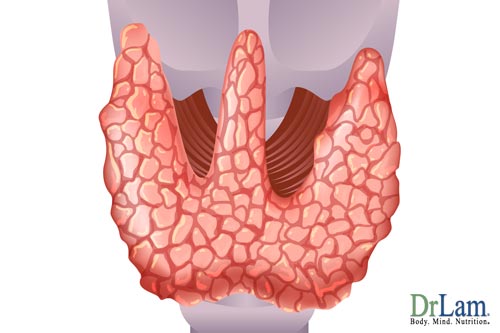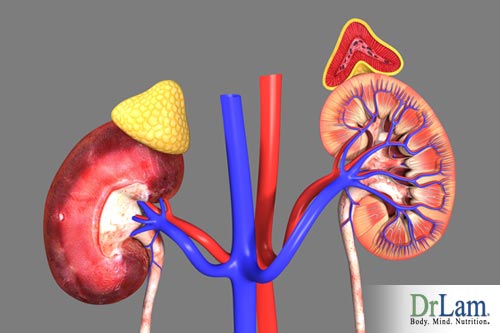 The thyroid gland, a little gland located in the front of the neck, is responsible for producing hormones that help keep the body functioning optimally. When the thyroid gland is not functioning as it should, the resulting symptoms include fatigue, forgetfulness, and even depression. Additional possible side effects of low thyroid functioning, or hypothyroidism, include weight gain, dry skin, hair loss, constipation, and feeling cold all the time.
The thyroid gland, a little gland located in the front of the neck, is responsible for producing hormones that help keep the body functioning optimally. When the thyroid gland is not functioning as it should, the resulting symptoms include fatigue, forgetfulness, and even depression. Additional possible side effects of low thyroid functioning, or hypothyroidism, include weight gain, dry skin, hair loss, constipation, and feeling cold all the time.
It is estimated that one in four women in the US can blame their middle age weight gain on low to borderline-low thyroid hormone levels. Women with normal thyroid function can burn calories more efficiently, have improved energy levels, maintain a healthy weight, regulate body temperature more effectively, and experience better emotional well-being.
Blood tests to measure the hormones produced by the thyroid are widely available. Quantities of TSH, T3, T4, and Free T4 are evaluated by measurements taken from a blood sample. If it is determined that your thyroid function is low, medication might be recommended to replace missing thyroid hormones. If you have been experiencing low thyroid function, starting this type of medication therapy has the potential to make you feel like a brand new person. The relief will feel like a miracle.
Unfortunately, it does not always work out so easily. A large percentage of people who suffer from low thyroid function do not feel any different on their medication. So, if you do not notice any improvement after being on medication, it is possible that there are complicating problems; for instance, the medication is not a good fit for you, the thyroid is not accepting the medication, or there could be additional factors that are keeping the medication from working as effectively as expected.
Based on the results of the laboratory tests, the recommended medication to correct thyroid imbalance may be a complex combination of T3 and T4, in synthetic or natural forms. It may be necessary to look at the whole picture from a holistic standpoint and determine if the thyroid problem is really severe enough to warrant thyroid medication. If a course of medication has been recommended, and the symptoms of low thyroid, such as dry skin, low body temperature, fatigue, etc., are still not alleviated, there is the possibility that thyroid medication is not the answer.
Thyroid adjustment, including rebalancing low thyroid function, is very difficult and is unique to every individual. If conventional medicine methods have been exhausted, perhaps thyroid medication is not what is going to rebalance your body.
 In such cases, the adrenal glands – a small gland whose function is very similar to that of the thyroid, and which works in close partnership with the thyroid, should be brought into consideration. The adrenal glands are about the size of a prune and one sits on top of each kidney. Perfectly positioned, they have tremendous impact on the functioning of all tissues, glands, and organs in the body. Additionally, they greatly influence thoughts and feelings. During midlife, energy and endurance heavily rely on proper adrenal function. It is during this time of life that a majority of people experience some level of adrenal meltdown. The source of this epidemic seems to be due to excessive emotional, physical, and even environmental stress.
In such cases, the adrenal glands – a small gland whose function is very similar to that of the thyroid, and which works in close partnership with the thyroid, should be brought into consideration. The adrenal glands are about the size of a prune and one sits on top of each kidney. Perfectly positioned, they have tremendous impact on the functioning of all tissues, glands, and organs in the body. Additionally, they greatly influence thoughts and feelings. During midlife, energy and endurance heavily rely on proper adrenal function. It is during this time of life that a majority of people experience some level of adrenal meltdown. The source of this epidemic seems to be due to excessive emotional, physical, and even environmental stress.
Adrenal Fatigue is often triggered or caused by stress. The stress may be due to a low-grade infection, emotional distress, physical challenges, or even psychological trauma. The adrenal glands seem to be negatively impacted by every type of stress imposed upon the human body.
People who experience Adrenal Fatigue live with a constant feeling of overall illness. This may be expressed as fatigue, lethargy, and lack of interest or enthusiasm in life. They may express that they feel “worn out”. They often turn to colas, coffee, tea, and other stimulants to keep their energy levels up to allow them to feel “normal”. These substances further stress the adrenal glands, which becomes a vicious cycle of feeling unwell and turning to stimulants to get through the day. It becomes nearly impossible to break free from this damaging and stressful cycle.
The adrenal glands secrete hormones into the bloodstream, according to the Society for Endocrinology. These chemical messengers travel to various parts of the body where they have specific jobs. The exterior of the adrenal glands, the adrenal cortex, secretes several important hormones. Two of these are cortisol, which helps your body manage stress, and aldosterone, which assists with regulating blood pressure. The inner part of the adrenal gland, the adrenal medulla, is responsible for releasing adrenaline on demand.
Adrenaline is the body’s response to “flight or fight” situations. Adrenaline allows your body to spring into action quickly, with either the strength to fight off an attack or the speed to run from one. It is also produced during the excitement of competition, the anxiety of speaking in public, and the thrill of riding a rollercoaster, or the panic of an automobile accident.
Symptoms of Adrenal Fatigue are similar to the symptoms of low thyroid function and often cause the two conditions to be confused. Individuals who are prone to hypothyroidism typically have weak adrenal glands as well. Essentially, the two glands work together to produce, and deliver essential hormones to wherever they need to be in the body.
When the adrenal glands begin to show signs of fatigue, one of the noticeable symptoms is that the body begins to slow down, and this slows thyroid function as well. Over time as this continues, the lab tests that measure thyroid function will be abnormal. Without factoring in the impact of Adrenal Fatigue, the thyroid numbers may suggest to a conventional doctor that medication is needed. If a patient takes a course of thyroid replacement medication, and the problem is indeed low thyroid function, then the problem should correct itself and rapid recovery is to be expected.
However, if the low thyroid problem does not show signs of improvement, the adrenals should be considered as the true source of the problem. It seems that many people with adrenal problems wind up with thyroid problems as well. In these cases, you may be given thyroid medication, but there is no improvement. Conversely, if your symptoms of low thyroid function are supported with adrenal fortification, the thyroid functioning improves, and the amount of thyroid medication can be reduced or eliminated.
 Primary care physicians are not explicitly trained in monitoring and caring for conditions associated with the adrenal and thyroid glands. Alternatively, specialized medical professionals who have completed in-depth research on the intricate functions and challenges related to the adrenal glands and thyroid are more equipped for this type of care.
Primary care physicians are not explicitly trained in monitoring and caring for conditions associated with the adrenal and thyroid glands. Alternatively, specialized medical professionals who have completed in-depth research on the intricate functions and challenges related to the adrenal glands and thyroid are more equipped for this type of care.
Self-medication is not recommended or suggested for the thyroid or adrenal glands. A specialized doctor that combines a well-monitored plan for thyroid health and a program of adrenal support may boost the healing and balancing process. As the adrenals receive the help they need to function properly, they will ultimately balance and correct thyroid function. Understanding what is behind the problems and symptoms, and figuring out why the body is having difficulty accepting medication is the key to correcting the imbalance.
© Copyright 2016-2020 Michael Lam, M.D. All Rights Reserved.
